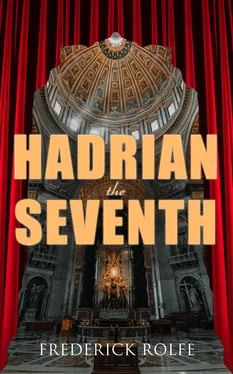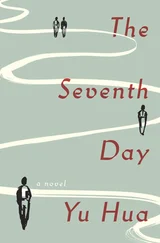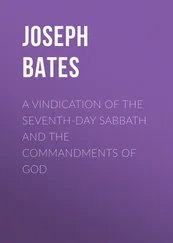"Your Eminency will understand that I do not wish to be disrespectful," he said to the senior, with as much quiet antipathy as could be crowded into one man's voice: "but the Bishop of Caerleon calls himself my friend; and I am at a loss to know to what I may attribute the honour of Your Eminency's presence, or the manner in which you will allow me to receive you."
"I hope, Mr. Rose, that you will accept my blessing as well as Dr. Talacryn's," the Cardinal-Archbishop replied in a voice where hauteur strangely struggled with timidity. He extended his hand. George instantly took it; and respectfully kneeled again, noting that this ring contained a cameo instead of the cardinalitial sapphire. Then he caused his guests to become seated. The atmosphere seemed to him laden with the invigorating aroma of possibilities.
"Zmnts wishes to ask you a few questions," the young bishop began; "and he thought you would not take it amiss if I were present as your friend."
George shot a glance of would-be affectionate gratitude at the speaker; and turned, saying "I have been imagining Your Eminency in Rome— in the Conclave."
"I was there until a fortnight ago; and then,— well, you are said to be an expert in the annals of conclaves, Mr. Rose, so it will interest you to know that we stand adjourned."
"For the removal of the Conclave from Rome?"
"Oh dear no! There is no need for removal. The Piedmontese usurpers treat us with profound respect, I'm bound to say. No. We simply stand adjourned."
"But this is extremely interesting!" George exclaimed. "Surely it's unique? And may I ask,— no, I would not venture to inquire the cause: but, is this generally known? I have seen nothing of it in the papers; and I am not on speaking terms with any Roman Catholics except the—"
"No. It is not generally known; and it is not intended to make an official announcement, for reasons which you will understand, and which, I believe, you will respect."
"I am much honoured by Your Eminency's confidence," George purred.
"Certain affairs required my personal presence in England"; the cardinal continued. He was a feeble aged man, almost senile sometimes. He hesitated. He stumbled. But he maintained the progression of the conversation on its hands and knees, as it were, with "These are very pregnant times, Mr. Rose."
George went to the door: admitted his cat who was mewing outside; and resumed his seat. Flavio brushed by cardinalitial and episcopal gaiters turn by turn: bounded to his friend's knee: couched; and became still, save for twinkling ears. The prelates exchanged glances.
"But perhaps you will let me say no more on that subject, and come directly to the point I wished to consult you upon." The cardinal now seemed to have cleared the obstacles; and he archiepiscopally pranced along. "It has recently been brought very forcibly to my remembrance that you were at one time a candidate for Holy Orders, Mr. Rose. I am cognizant of all the unpleasantness which attended that portion of your career: but it is only lately that I have realised the fact that you yourself have never accepted, acquiesced in, the adverse verdict of your superiors."
"I never have accepted it. I never have acquiesced in it. I never will accept it. I never will acquiesce in it."
"Would you mind telling me your reasons?"
"I should have to say very disagreeable things, Eminency."
"Never mind. Tell me all the truth. Try to feel that you are confiding in your spiritual father, whose only desire is to do justice— I may even say to do justice at the eleventh hour."
"I am inclined indeed to believe that, because you yourself have condescended to come to me. I wish, in fact, to believe that. But— is it advisable to rake up old grievances? Is it desirable to scarify half-healed wounds? And, how did Your Eminency find me after all these years?" The feline temper of him produced dalliance.
"It certainly was a difficult matter at first. You had completely disappeared—"
"I object to that," George interrupted. He suddenly saw that this was the one chance of his life of saying the right thing to the right person; and he determined to fight every step of the way with this cardinal before death claimed him. "I object to that," he repeated. "I neither disappeared nor hid myself in any way. There was no question of concealment whatever. I found myself most perfidiously deserted; and I went on my way alone, neither altering my habits, nor changing my appearance—"
"There was no implication of that kind, Mr. Rose."
"I am very glad to hear Your Eminency say so. But such things are said. They are the formulæ which spite or indolence or foolishness uses of a man whom it has not seen for a month. Sometimes they are detrimental. To me they are offensive; and I am not in a mood to tolerate them."
The cardinal swallowed the cachet; and proceeded, "I first wrote to you at your publishers; and my letters were returned unopened, and marked Refused. "
"That was in accordance with my own explicit directions. A few years ago, the opportunity was given me of drawing a sharp line across my life—"
"You mean—"
"I allude to a series of libels which were directed against me in the newspapers, especially in Catholic newspapers— dirty Keltic wood-pulp—"
"Precisely. But why was that an occasion for drawing what you call a sharp line across your life?"
"Eminency," said George, calming down and setting out to be concise and categorical, "scores of people who had known me all my life must have seen that those attacks were libellous, and false. You yourself must have seen that." He stretched out a hand and opened and shut it, as though claws protruded from velvet and retired. "Yet only a single one out of all those scores came forward to assure me of friendship in that dreadful moment. All the rest spewed their bile or licked their lips in unctuous silence. I was left to bear the brunt alone, except for that one; and he was not a Catholic. Except from him, I had no sympathy and no comfort whatever. I don't know any case in all my reading, to say nothing of my experience, where a man had a better or a clearer or a more convincing test of the trueness and the falseness of his friends. Not to do any man an injustice, and that no one might call me rash or precipitate in my decision, I waited two years— two whole years. The Bishop of Caerleon came to me in this period of isolation; and one other Catholic, a man of my own trade. Later, that one betrayed me again, so I will say no more of him. Women, of course, I neglect. And the rest unanimously held aloof. Then I published a book; and I told my publishers to refuse all letters which might be addressed to them for me. The sharp line was drawn. I wanted no more fair-weather friends, afraid to stand by me in storms. If, after those two awful years, I had received overtures from my former acquaintances, I really think I should have fulminated at them St. Matthew xxv. 41–43—"
"What is that?"
"'I was an hungred and ye gave me no meat' down to 'Depart from me, ye cursed, into æonial fire.' Yes, the sharp line was drawn across my life. I had one true friend, a protestant. As for the Faith, I found it comfortable. As for the Faithful, I found them intolerable. The Bishop of Caerleon at present is the exception which proves the rule, because he came to me in the teeth of calumny."
"You are hard, Mr. Rose, very hard."
"I am what you and your Catholics have made me."
"Poor child— poor child," the cardinal adjected.
"I request that Your Eminency will not speak to me in that tone. I disdain your pity at this date. The catastrophe is complete. I nourish no grudge, and seek no revenge, no, nor even justice. I am content to live my own life, avoiding all my brother-Catholics, or treating them with severe forbearance when circumstances throw them in my path. I don't squash cockroaches."
Читать дальше











